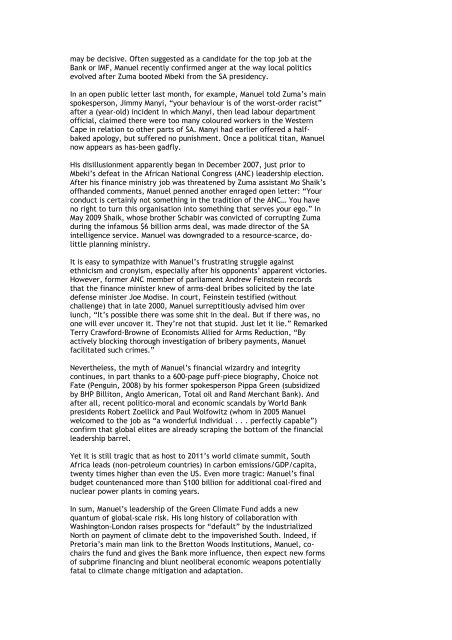April 2011 - Centre for Civil Society - University of KwaZulu-Natal
April 2011 - Centre for Civil Society - University of KwaZulu-Natal
April 2011 - Centre for Civil Society - University of KwaZulu-Natal
Create successful ePaper yourself
Turn your PDF publications into a flip-book with our unique Google optimized e-Paper software.
may be decisive. Often suggested as a candidate <strong>for</strong> the top job at the<br />
Bank or IMF, Manuel recently confirmed anger at the way local politics<br />
evolved after Zuma booted Mbeki from the SA presidency.<br />
In an open public letter last month, <strong>for</strong> example, Manuel told Zuma’s main<br />
spokesperson, Jimmy Manyi, “your behaviour is <strong>of</strong> the worst-order racist”<br />
after a (year-old) incident in which Manyi, then lead labour department<br />
<strong>of</strong>ficial, claimed there were too many coloured workers in the Western<br />
Cape in relation to other parts <strong>of</strong> SA. Manyi had earlier <strong>of</strong>fered a halfbaked<br />
apology, but suffered no punishment. Once a political titan, Manuel<br />
now appears as has-been gadfly.<br />
His disillusionment apparently began in December 2007, just prior to<br />
Mbeki’s defeat in the African National Congress (ANC) leadership election.<br />
After his finance ministry job was threatened by Zuma assistant Mo Shaik’s<br />
<strong>of</strong>fhanded comments, Manuel penned another enraged open letter: “Your<br />
conduct is certainly not something in the tradition <strong>of</strong> the ANC… You have<br />
no right to turn this organisation into something that serves your ego.” In<br />
May 2009 Shaik, whose brother Schabir was convicted <strong>of</strong> corrupting Zuma<br />
during the infamous $6 billion arms deal, was made director <strong>of</strong> the SA<br />
intelligence service. Manuel was downgraded to a resource-scarce, dolittle<br />
planning ministry.<br />
It is easy to sympathize with Manuel’s frustrating struggle against<br />
ethnicism and cronyism, especially after his opponents’ apparent victories.<br />
However, <strong>for</strong>mer ANC member <strong>of</strong> parliament Andrew Feinstein records<br />
that the finance minister knew <strong>of</strong> arms-deal bribes solicited by the late<br />
defense minister Joe Modise. In court, Feinstein testified (without<br />
challenge) that in late 2000, Manuel surreptitiously advised him over<br />
lunch, “It’s possible there was some shit in the deal. But if there was, no<br />
one will ever uncover it. They’re not that stupid. Just let it lie.” Remarked<br />
Terry Craw<strong>for</strong>d-Browne <strong>of</strong> Economists Allied <strong>for</strong> Arms Reduction, “By<br />
actively blocking thorough investigation <strong>of</strong> bribery payments, Manuel<br />
facilitated such crimes.”<br />
Nevertheless, the myth <strong>of</strong> Manuel’s financial wizardry and integrity<br />
continues, in part thanks to a 600-page puff-piece biography, Choice not<br />
Fate (Penguin, 2008) by his <strong>for</strong>mer spokesperson Pippa Green (subsidized<br />
by BHP Billiton, Anglo American, Total oil and Rand Merchant Bank). And<br />
after all, recent politico-moral and economic scandals by World Bank<br />
presidents Robert Zoellick and Paul Wolfowitz (whom in 2005 Manuel<br />
welcomed to the job as “a wonderful individual . . . perfectly capable”)<br />
confirm that global elites are already scraping the bottom <strong>of</strong> the financial<br />
leadership barrel.<br />
Yet it is still tragic that as host to <strong>2011</strong>’s world climate summit, South<br />
Africa leads (non-petroleum countries) in carbon emissions/GDP/capita,<br />
twenty times higher than even the US. Even more tragic: Manuel’s final<br />
budget countenanced more than $100 billion <strong>for</strong> additional coal-fired and<br />
nuclear power plants in coming years.<br />
In sum, Manuel’s leadership <strong>of</strong> the Green Climate Fund adds a new<br />
quantum <strong>of</strong> global-scale risk. His long history <strong>of</strong> collaboration with<br />
Washington-London raises prospects <strong>for</strong> “default” by the industrialized<br />
North on payment <strong>of</strong> climate debt to the impoverished South. Indeed, if<br />
Pretoria’s main man link to the Bretton Woods Institutions, Manuel, cochairs<br />
the fund and gives the Bank more influence, then expect new <strong>for</strong>ms<br />
<strong>of</strong> subprime financing and blunt neoliberal economic weapons potentially<br />
fatal to climate change mitigation and adaptation.
















